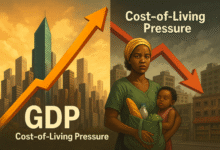Lagos residents decry non-implementation of free antenatal, delivery services

Some residents of Lagos have decried the non-implementation of the state government’s free antenatal and child delivery services at some General Hospitals and Primary Healthcare Centres (PHCs) in the state.
The residents spoke in separate interviews with the News Agency of Nigeria (NAN) on Sunday in Lagos.
BRANDPOWER reports that Lagos State Governor, Babajide Sanwo-Olu, had, during a media chat on Feb. 22, announced sweeping interventions which the state would be implementing in order to reduce the effects of the current economic hardship on its citizens.
Hardship: Stay off crime, Lagos Commissioner advises youths
On health, Sanwo-Olu reintroduced free child delivery programme for expectant mothers in all the state-owned General Hospitals and special maternity centres.
According to the governor, the state government will take up the cost of the child delivery, including caesarean section.
It would also reduce the cost of some certain drugs, such as hypertension medication.
The residents said that the free antenatal and child delivery services was a lip-service, stressing that the hospitals charged for every service rendered.
Mrs Funmilayo Olatunji, a trader who delivered at Ikorodu Health Centre, Ita-Elewa, said that delivery wasn’t free at the centre.
“I had normal delivery at the centre in February 2024. We paid N8,000 for child delivery fees, N10,500 for vaginal tear, and a cartoon of Maltina.
“I’m surprised to hear that the child delivery service was meant to be free at government facilities because the reverse was my experience,” she said.
Similarly, Mr Michael Adebiyi, whose wife delivered at Ikorodu General Hospital, Ebute, said he spent over N250, 000 for caesarean section delivery and consumables at the hospital.
“My wife gave birth in February, and we paid for everything needed for the delivery from blood to caesarean section charges.
“Nothing was free; in fact, I’m still owing some people because I had to run around to source for the money.
“I was happy when I heard last year that expectant mothers would enjoy free child delivery services at government health facilities as part of relief measures to ease economic burden on families.
“The government should put mechanism in place to ensure that policies made truly impact on the lives of citizens,” he said.
Also, Mrs Stella Nwosu, a hairstylist, said that she switched to a trado-medical centre for antenatal and child delivery due to the high service charges.
“Sometimes in September, I went to Amuwo-Odofin General Hospital to register for antenatal service and was told to pay ₦30,000.
“We couldn’t afford it because every child care item is expensive and to feed is even a challenge. My mother-in-law took me to a traditional birth attendant, and I delivered my baby there,” she said.
A healthcare worker, who pleaded anonymity, told NAN that many pregnant women pay out-of-pocket for antenatal and delivery services at many government-owned facilities.
She opined that the programme required improved planning, compliance monitoring, and management for sustainability.
The healthcare worker noted that the economic situation of the country, which led to increased cost of products, especially medicines and healthcare services, would worsen the plight of couples with unplanned pregnancy.
She advised couples to take smart decisions, stressing that child care was a lifelong socio-economic experience that extends beyond access to free antenatal and child delivery services.
BRANDPOWER reports that Gov. Babajide Sanwo-Olu, also in 2023, during the state’s Security Council meeting on July 31, 2023, had directed General Hospitals and Primary Health Care Centres to offer free antenatal care and child delivery services.
This is part of relief measures to ease the burden of the fuel subsidy removal.
The medical intervention will cover the cost of antenatal care, including the cost of registration and ANC clinics, as well as normal and cesarean section child delivery services.
It also seeks to increase access to quality maternal and child health services in line with the state government’s Universal Health Coverage attainment drive.











